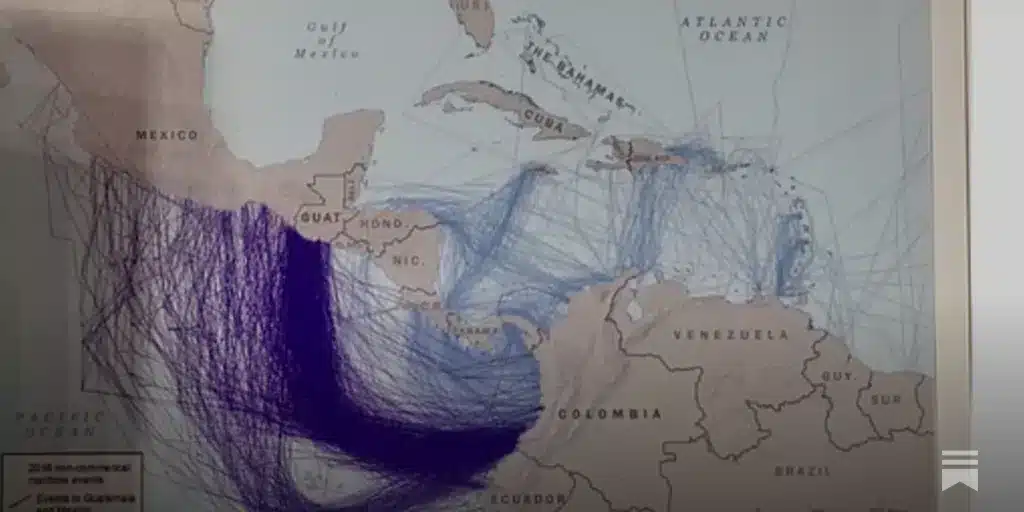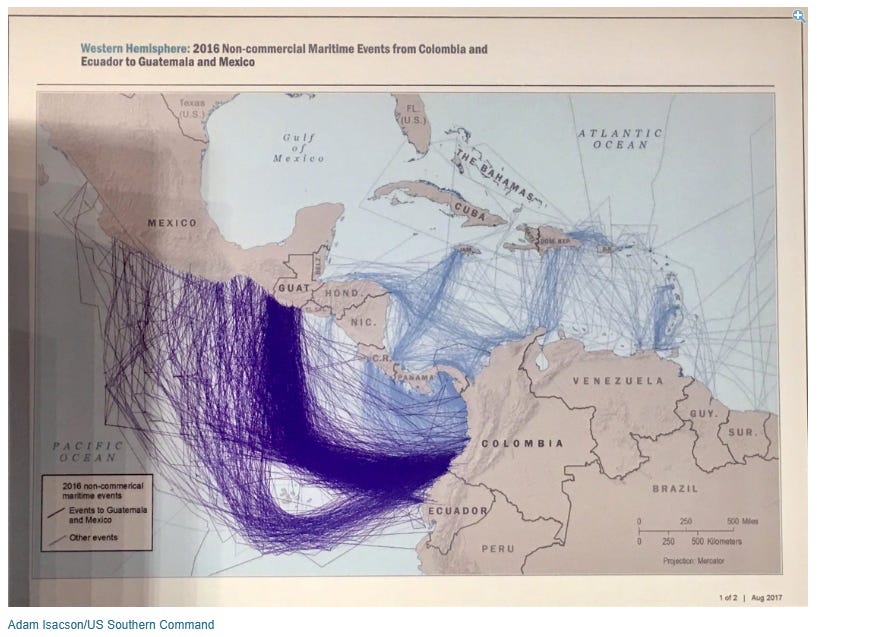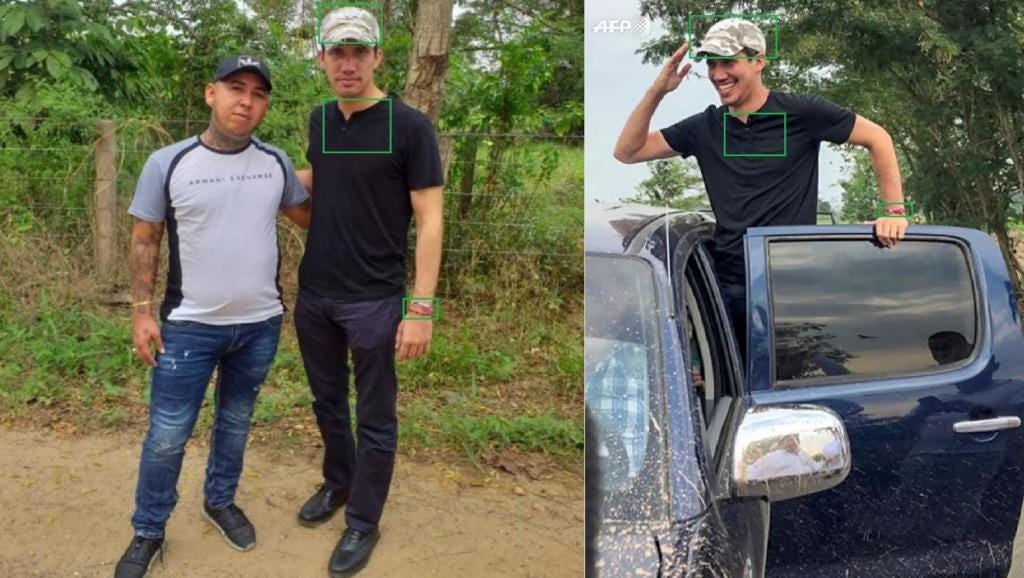
Maritime drug flows from South America in 2017. Photo: Adam Isaacson.

Orinoco Tribune – News and opinion pieces about Venezuela and beyond
From Venezuela and made by Venezuelan Chavistas

Maritime drug flows from South America in 2017. Photo: Adam Isaacson.
By The Anti Empire Project and Joe Emersberger – Sep 14, 2025
And the plan to bring Israel’s post-2023 genocidal warfare to the Americas
US/Israel rules of war: build a lie, then slaughter civilians from the air
There’s a widespread belief that every lie contains a kernel of truth. If it was ever the case it is not any more. The belief is a potent tool in the hands of an imaginative propagandist who is capable of inventing a lie from whole cloth. Such is the nature of the lie about Venezuela being a source of drugs. It is a lie that has been invented in front of us, in real time. For while the US has been trying to destroy Venezuela for decades, it has now become even less honest about it than it used to be.
We live in an age of the whole cloth type of lie. Joe Biden talked about seeing photos of beheaded babies that he did not, in fact, see. Tony Blinken solemnly told the story of murderers eating lunch with a dead family that never existed. Eli Beer said he saw a baby in an oven that, like Biden, he did not, in fact, see. Yossi Landau reported seeing beheaded babies that he did not, in fact, see. Direct, specific, detailed, lies.
Why they told these lies is obvious enough: to justify crimes, the enemy must be dastardly and to justify genocide, only the most lurid tales are worth telling. American media has a long and sordid history of atrocity propaganda. Specific lies are told to create specific outcomes.
In the American arsenal of lies, the “Venezuela drugs” lie is perhaps most analogous to the “Hamas uses human shields” lie. For if “Venezuela drugs” is true, any kind of “war on drugs” action is justified, the same way “Hamas uses human shields” opens up all the world to any kind of genocidal act. Any human is killable as a “Hamas human shield”, and any act of theft or warfare can be justified in fighting the drugs.
The US and Israel have learned that they can act without moral or legal restraint and have found the political costs of committing genocide containable, the levels of dissent for bringing wars to new countries (Yemen, Iran, Qatar…) bearable. Harris and Emersberger have argued recently that it is very difficult to imagine a way to avoid escalating attacks on Venezuela, however unlikely they may be to lead to “regime change”.
Post-2023 propaganda is so brazen that at times it seems it isn’t even intended to be believed by its own adherents. We are not sure of the value of debunking it. But we do so in the hope that by watching how they make a story from nothing, we can learn something about how they plan to do propaganda in their new genocidal world.
The first decades of the US assault on Venezuela’s democracy took place without the slightest “drugs” pretext
We wrote a book that debunked US government propaganda about Venezuela spanning over two decades: 1998- 2021. We showed that the US government’s lies were also the western media’s lies- as well as the lies told by prominent NGOs like Human Rights Watch and Amnesty International. All these dishonest institutions worked in unison to depict Venezuela as becoming a dictatorship after the election of Hugo Chávez in 1998.
In our book, you’ll find very little debunking of the idea that Venezuela is a hub for drug trafficking. That’s because that particular lie played almost no role in US propaganda about Venezuela until 2020.
On the contrary, we noted in our book that during the 1980s the organized groups in poor urban neighborhoods that later developed into the base that brought Chavez to power were largely motivated to keep drug dealers out of their neighborhoods. With hindsight, we should also have mentioned that the CIA was caught shipping drugs through Venezuela into the US during the early 1990s. A pro-US government was in office at that time.
As US-led efforts to overthrow Venezuela’s government intensified after the death of Chavez in 2013, so did ferocity of the attacks by media and NGOs on Chavez’s successor, Nicolas Maduro. If you believed the media’s Venezuela coverage, you’d have thought that Venezuela was going through a famine – all because Maduro was tyrannical, incompetent and corrupt. That was the media’s chosen lie for that time: it had nothing to do with Venezuela supposedly shipping drugs to the US.
In 2015, when Obama first declared a “national emergency” claiming Venezuela an “extraordinary threat” to the U.S., the media downplayed that lunatic claim. It was reported as a mere legal “formality” Obama used to punish Venezuela over its alleged lack of democracy and human rights.
The imperial script didn’t change initially under Trump. In February of 2019, the US brought “humanitarian aid” to Colombia (an actual hub of the US-controlled hemispheric illicit drug trade) and demanded that it be allowed into Venezuela. As late as 2019, Trump was still claiming to be motivated by a desire to bring democracy and prosperity to Venezuela. There was an obvious threat of a US invasion during the aid stunt, but it turned out to be a bluff aimed at enticing the Venezuelan military to defy Maduro. It failed.
That’s when Trump changed the propaganda script.
The “extraordinary threat” posed by Venezuela would now be sold as a reality, not a legal “formality” everyone was supposed to ignore.
2020: Enter the “Venezuela drugs” lie
In 2020, Trump said the US would give a $15 million reward to people who helped capture Maduro. Trump’s Department of Justice formally charged Maduro (and many of his top officials) with attempting to “flood the United States with cocaine”. The same media that had downplayed Obama’s declaration of an “extraordinary threat” from Venezuela began to report Trump’s ridiculous claims with minimal scrutiny. In other words, the media followed the new White House script on Venezuela.
But massive plot holes in the new script were obvious and easily found in establishment media – in articles that were written before Trump changed the script. Business Insider, citing the US Strategic Command, had published a map (shown below) in 2017 showing the countries from which illegal drugs flowed north towards the US. The routes were overwhelmingly from Colombia, with barely any from Venezuela. In fact, the article never mentioned Venezuela at all.

An additional plot hole: in September of 2020 photos and video emerged of Juan Guaido smiling with ( and being chauffeured around by) members of the armed Colombian drug-trafficking gang, Los Rastrojos. Juan Guaido was the Venezuelan legislator that Trump had christened as Venezuela’s interim president in 2019.

Yet another plot hole: The Alex Saab case. In 2020, the U.S. government kidnapped Saab, a businessman and special envoy for Venezuela’s government, and charged him with money laundering, but it did not accuse him of drug trafficking. The U.S. claimed Saab had illegally profited from Venezuelan government contracts – and that he had moved the profits through US banks, thus bringing him under universal US Treasury jurisdiction. The US claimed Saab was a key player in Maduro’s supposed corruption network. If that were true, wouldn’t Saab have played a role in “flooding US streets with cocaine” as Trump now alleged?
While Saab was imprisoned, articles appeared spreading US claims that Saab had been an informant for the US Drug Enforcement Agency (DEA). But if Saab had betrayed Venezuela he’d have been given asylum in the U.S., not kidnapped and imprisoned. And he would not have dared return to Venezuela.
Saab was released in 2023 in exchange for ten US citizens who were imprisoned in Venezuela. Saab, who is Colombian-born, not only returned to Venezuela but was appointed Maduro’s Minister of Industries and National Production.
Manufacturing fear, not consent
The other day, US Secretary of State Marco Rubio dismissed a reporter who asked him about a recent UN report on the illegal drug trade. The reporter noted that 87% of US-bound shipments go through Colombia and Ecuador; only 5% go through Venezuela. “I don’t care what the UN says” huffed Rubio in response . To add to the absurdity, Rubio said this while visiting Ecuador, where US-backed rightwing rule has, since 2017, transformed the country into a key part of the illegal drug trade.
Rubio’s contemptuous response raises a chilling question. Does the U.S. even care if the public buys the drug pretext?
Is “manufacturing consent” important to them at this point – when the US is openly sponsoring a Holocaust in Gaza? It seems they don’t care very much if we hate what they do. They simply don’t think we can stop them.
Washington Projects Its Drug Problem Onto Latin America: Narco-State Myth Used to Attack Venezuela
The eternal “War on Drugs”, real-world countries with drug problems, real-world solutions to drug problems…
The war on drugs was coined by Richard Nixon in 1971, formally declared by Ronald Reagan in 1982. By contrast, the US occupation of Afghanistan ended after 20 years. After Israel’s occupation of Palestine (77 years), the war on drugs, 43 years on, must be one of the longest running wars in the world. Drugs aren’t really a belligerent though, so it isn’t actually a war.
In fact the changing legal status of drugs, the infrastructures of police, informants, incarceration, counterinsurgency, and US regime change campaigns have all been very useful US foreign policy tools in the USA, in the Americas, in Afghanistan, in Southeast Asia, in Eastern Europe – all over the world. Colombian and Bolivian peasants, Black people in the US, understood the “drug war” as a rhetorical tool to oppress them. But the “drug war” is much more than this: it is a sphere of massive wealth accumulation in its own right, with the fortunes deposited ultimately in Western banks. It is a method for raising off-the-books cash to pay for bribes, assassinations, massacres, and land theft operations. It remains the principal rationale for a number of US government agencies and millions of American jobs – between the illegal drug trade and the law enforcement and judiciary officials whose livelihoods depend on it.
Watching TV series like The Wire or Narcos, you get a false sense of how the business evolves and control of it moves from one group in one city to the next. The big picture missed on prestige television is that this is a global business which, like all big business in this world, can only occur with active facilitation by the US and will ultimately end up in US oligarchic hands – which it has. Which is why neither the drug business nor the war on drugs are going anywhere. If regime change succeeds and Venezuela becomes a colony of the US again, you can expect the country will actually become a drugs hub like Afghanistan was during the decades of US occupation and Colombia is today.
Does drug addiction cause harm? Of course it can. Many countries around the world have programs to address these harms. Some are harsh, like the Taliban’s faith-based prohibition program in Afghanistan. Others, like Iran’s program of registering addicts and providing a maintenance dose, are less so. Cuba has had success with a model of registration and compulsory abstinence with community support. Recreational marijuana (and alcohol and tobacco) is legal and big business in Canada. Venezuela has a fairly punitive approach. But only the US has gone to war with drugs for 45 years and counting.
It’s always been known how the US could win the war on drugs: legalization and state control. But many would lose from that victory, and these are all-important constituencies: police, state agencies, covert operators, bankers, and narcotraffickers galore. Don’t ask America to turn her back on its most beloved. The drug war is the gift that keeps on giving.
But that doesn’t answer why the switch of lies happened five years ago. About this, we can only speculate. Why did the US decide to change from vilifying socialism and alleging procedural constitutional violations to instead scream about “drugs”?
The answer is unlikely to be deep. Perhaps there was a focus group where one pretext was going stale and another resonated better. Perhaps the “drug” pretext carries with it the possibilities of more incremental demonstrable “wins” – a video of a blown up boat, perhaps seizures of planted contraband for photos, more deportations of Venezuelans. Maybe this is a better image and content engine than one regime change failure after another.
Drugs are also a pretext that gives the US more freedom to attack or threaten other neighbours, since there are few socialists in power and drugs can be attributed to anyone. Then again, socialists can also be invented where they don’t exist.
Regime change remains a very difficult proposition, even if the US expands its atrocities, as it almost certainly will. Exposing their lies must have some value, but much more than that is needed to stop them.
Support Groundbreaking Anti-Imperialist Journalism: Stand with Orinoco Tribune!
For 7 years, we’ve delivered unwavering truth from the Global South frontline – no corporate filters, no hidden agenda.
Last year’s impact:
• More than 200K active users demanding bold perspectives
• 216 original pieces published in 2025 alone
Fuel our truth-telling: Every contribution strengthens independent media that actually challenges imperialism.
Be the difference: DONATE now to keep radical journalism alive!